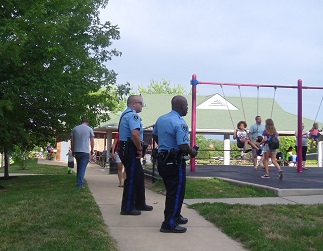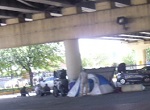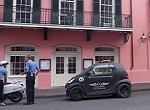Trust in Police Grows When Both Community and Officers Make the Effort
Last Updated: June 19, 2024
Building up resident trust in police is vitally important to both neighborhoods and entire cities.
But wait--police initiated violence, over-reaction, and discrimination mean that right at the outset, we must assert in the strongest possible terms that trust in institutions is earned and that police must be trustworthy if democratic society is to work well. This necessitates a thorough review of practices, language, and attitudes that are discriminatory toward racial and other minorities, whether or not the intent is malicious in a particular instance. It also means that standards of police behavior must be clear and that individual officers and their departments must be held accountable for serious errors and departures from standards.
We cannot tolerate inequities in how police treat groups of people. Police who prove to be poorly suited to the job must not be protected by overly powerful police unions or by politicians who want to score points for being the toughest on crime.
I also think it is important to acknowledge that the list of police
responsibilities has grown to a breadth that does not play to the strengths of
people who are willing to spend a career in law enforcement. When police must
be social workers, mental health first responders, code enforcement officers, or
substance abuse and domestic dispute interventionists, as well as those who work
fearlessly to capture and neutralize the most dangerous people in society, we
are asking for a skill set that very few individuals can master.
We do think there is a vital role for police, who should be able to concentrate on preventing and de-escalating violence and serious crimes against property.
Thus cities need to decouple core police functions from tasks that do not have to be performed by police and may in fact be better addressed by other professions. In cities where the "defund the police" slogan has gained traction, take advantage of the situation to identify more appropriate professional backgrounds for some tasks and to require that every detail of police budgets be justified to the same degree that social service, planning, community development, and public health budgets are scrutinized.
We firmly believe that both the community and the first responders must examine their attitudes and practices before mutual suspicion, lack of cooperation, and a downward spiral of lawlessness and violence can end in a community. Let's look for ways to practice sympathy and empathy.
Trust in police is certainly not uniformly low. At the top of the article, we want to applaud the many communities that have avoided polarization between residents and police, and encourage them to keep doing what works.
At the same time, we see
that in almost every major city, many smaller cities, and in particular in many,
many urban and minority neighborhoods, the undertone of mistrust is strong.
Why Trust in Police Must Be Rebuilt
Let's focus on why the mistrust itself is an issue:
- People are more likely to be law-abiding when police are trusted. As the report of the task force on 21st century policing states, "Decades of research and practice support the premise that people are more likely to obey the law when they believe that those who are enforcing it have authority that is perceived as legitimate by those subject to the authority." (Source: Final report of the President’s Task Force on 21st Century Policing, Washington, D.C., USA: Office of Community Oriented Policing Services, May, 2015, p. 15)
- Lack of trust in police to protect resident whistleblowers reduces witness cooperation, which ultimately leads to more criminals and potential criminals out on the street.
- A mistrustful public is less likely to report observations and experiences that would help the police identify culprits in particular instances and correctly spot patterns.
- Lack of trust in police makes officers more jittery and therefore more prone to make a mistake or to over-react.
- Similarly, suspects become more afraid and more likely to assault and resist police.
- It contributes to neighborhood decline, population loss, and abandonment as a general feeling of helplessness in the face of crime and disorder builds.
- When police do not act trustworthy, or when they are required to enforce trivial real or imagined infractions against society, this only reinforces an anti-government, anti-community, and anti-civil society mindset that can lead residents into unproductive cynicism about democracy and authority in general.
We know that you are already aware of these factors, but we want you to think for a moment about how important it is that you address trust in police within your neighborhood and city. Grow your tolerance for mistrust among African-Americans when you realize that many police departments actually trace their origins to posses that rounded up runaway slaves.
In a similar vein, you can expand your understanding of mistrust among Latinos when you educate yourself about the irrational immigration policies of the U.S. and the life and death threats that many undocumented immigrants were experiencing in their home countries. If you are outside the U.S., quite possibly there are similar situations with minorities or recent emigrants and refugees.
To rebuild trust in police, it will be helpful for the community to acknowledge these historical and contemporary reasons for some groups to feel skeptical or hostile.
How Policing Practices Too Often Create Negative Community Perceptions

Since we don't shy away from telling you what we think on this website, we want to say at the top of this section that we don't think it is fair or truthful to blame the police for each and every instance of an innocent person being stopped, questioned, detained, or even shot as a result of a split-second judgment about perceived life-threatening danger. We certainly don't want to do away with police departments as currently constituted either, although we must report that recently we have talked with several thoughtful people who can argue for that solution quite convincingly.
We think there is hope that law enforcement can move beyond some of the behaviors that help to create and support the idea that neighbors can't trust the police.
Yet there's no doubt that some police units really need to improve their practice, and that they can do so with clearer standards. So here we offer two key areas where we think many urban police departments can improve in dealing with residents inside of neighborhoods. We aren't telling police leadership anything they aren't well aware of, but our goal is to inform residents about where they might focus in their activism about accountability.
First and foremost, it bears repeating that trust in police will be a by-product of their acting trustworthy. It's just like interpersonal relationships; if you act right, admit mistakes when you make them, and understand when another human being has a different life experience and set of perceptions from you, you will improve the relationship over time.
And just like in personal relationships, if there is a serious breach of trust, it takes a long time and a series of positive interactions to repair it. Like in other human endeavors, someone who feels picked on will become more and more reactive when a behavior they find offensive is repeated. So it is a police responsibility to try very hard to avoid repetitive mistakes in judgment. This will compound the problem of lack of trust in police.
Body cameras and public security cameras may be necessary and appropriate for showing officers acting trustworthy, identifying problem police behavior, and helping residents build empathy with an officer who must try to peer into a potential perpetrator's mind and then decide in an instant whether his or her own life is in danger. Of course the cameras must be operational at all times, which has proven to be a challenge in some communities.
Secondly, racial profiling creates so much negativity in the community that it's no wonder that often neighbors become reluctant to deal with the police. Unfortunately the children readily pick up on that vibe. The profiling eventually becomes a self-fulfilling prophecy. As more racial, ethnic, or other minorities are stopped, questioned, and searched at disproportionate rates compared to treatment of the majority, it's only natural that more drugs, guns, bootlegged movies, and so forth are found. Then some police feel even more justified in profiling.
The issue of profiling is more difficult than many community folks can appreciate. We human beings judge one another on the basis of probabilities very often. Talking to community people for a minute, suppose you were in a store and someone ask for a hip-hop vinyl record. Cameras show that only two people in the store at the time. One is an 80-year-old woman and the other is a 17-year-old male. Which one do you think wants the hip-hop? Um, we thought you would make a generalization.
Police are no different. Yet we have to ask them to be very careful that their hunches actually align with statistical probabilities and that instinctive reactions don't govern behavior. Even when police perceptions of group tendencies are verified by data, we of course have to ask that and expect that our police make every reasonable effort to avoid profiling except in genuinely life and death situations. We should expect and demand that all residents are treated respectfully and reasonably, regardless of their surface characteristics.
We as residents also want minority community members, and indeed all residents and visitors, to be treated proportionally to their misdeed. Jaywalking, walking through a swanky store, non-functioning tail lights, or expired license plates shouldn't be occasions for a lengthy stop just because a person is black or brown; all residents should be treated the same in these situations. Yet many minority folks have firsthand knowledge that this is not the case.
By working hard on acting trustworthy repeatedly and on reducing racial and other kinds of profiling, officers and departments can improve trust in police.
One relatively simple reform to try involves reducing the number of traffic stops. Traffic stops are the most common interaction that residents have with police. Jennifer Eberhardt of Stanford University, author of the 2019 book Biased: Uncovering the Hidden Prejudice That Shapes What We See, Think, and Do, has worked with Oakland, California, police to see what would happen if they reduced stops. They reduced them from about 32,000 in 2017 to 19,000 in 2018, amounting to 43% fewer stops, by asking themselves before a stop whether they have prior information to link the specific vehicle or person to a specific crime. Yet crime rates did not increase. (Source for Oakland data: Belinda Luscombe, "Bias Expert Jennifer Eberhardt on the Key to Police Reform," Time, June 22-29, 2020, p. 37).
This research just reinforces to us the concept that many minority community members in particular view traffic stops as a form of harassment.
Community Organizations Can Lead the Way in Increasing Trust in Police
We see a shorter but equally challenging "to do list" for the community. If your neighborhood wants to decrease over-reaction and under-responsiveness on the part of police, your neighborhood association should lead the way. (If you don't have one, we have a series of pages on how to start a neighborhood association and an inexpensive e-book giving greater detail on that topic.) If you have so much disorganization that a neighborhood association is too weak or can't be sustained, at least you can and should organize a block unit that will lead the charge.
Our big point is that you can't do this by yourself, and you shouldn't try.
If you want to bring crime under control in your neighborhood, it is absolutely critical that witnesses to crimes and suspicious behavior be willing to speak up and talk with police about what they saw and experienced. Without this, offenders go free and eventually are likely to cause trouble for someone again.
You need to show police that you have an organization that will help build resident trust in police to protect their identities if they provide information. If the police are acting stupid by spending time in the house next door to a criminal, then knocking on the suspect's door immediately thereafter--only a neighborhood group can be strong enough to address this behavior with them and work out a better way for people with information to pass along that intelligence without endangering themselves.
Your neighborhood association can work toward providing a neutral meeting place, for example, that can afford some measure of anonymity for those who can provide intelligence. A healthy neighborhood has community meeting places, so if you don't have a good coffee shop or community center, start one. And provide a private place within that venue where police and resident conversations can happen but where a resident can feel safe because many other community people are in the building talking with each other and having a good time.
The organization also needs to work diligently with residents to see that regardless of the indignities or injustices they may have suffered at the hands of police in the past, in the end it is the community members themselves who are at risk of being victims of crime. The neighborhoods need to wise up and decide that they can and will cooperate with the police to bring bad actors to justice, even if they are someone's nephew, grandson, or brother.
Your neighborhood association, or block unit as a last resort, can be the venue where police get to know well-meaning residents, and where those residents can begin to understand some of the struggles and challenges of being a police officer. Officers who have less than satisfactory racial attitudes usually will be turned around only through positive interactions with different races and ethnicities, not through sitting in seminars or going through sensitivity training.
Especially if your city does not have a strong and well-supported program of community policing, your neighborhood association needs to fill the void.
Another valuable role for your own neighborhood association to spearhead would be a move toward a civilian oversight board if your community does not already have one. If it does, how well is it working? Can you do something about it?
Larger Forces at Work in the Distrust Problem
We see both neighborhood leaders and cops on the beat able to increase their mutual understanding when they focus together a few moments on the fact that some of the suspicion and alienation between the two groups has happened because of the larger framework of the criminal justice system, the legislative system, and even a community development system that has sometimes worked against racial understanding rather than for it. (If interested in this topic, see our important page about racial equity and community development.)
To cite just one example, the "war on drugs" sometimes led to over-zealous prosecution for possessing minor amounts of an illegal substance. Unfortunately sentencing guidelines punished crack cocaine, the form that was most affordable and popular in minority communities, much more harshly than the upper middle class forms of cocaine, leading in part to the mass incarceration problem in the U.S. today. Some of the community people automatically blame the police for this situation, when actually there are plenty of others who are complicit in the problem of too many people being in jail for drug offenses.
Another example revolves around a culture of glorifying guns and failing to enact common sense gun control. Law enforcement officers are facing a much greater intensity of real-world threat to their lives than would be the case without such ubiquity of guns meant to kill humans.
A third example results from the reliance of a few local governments on revenue from fines for misdemeanors. This thoroughly obnoxious incentive system in which police departments are encouraged to help find general revenue should never be tolerated.
Finally, some ingrained habits of police departments are partly to blame. Too many patrols are automobile-based, and too many officers are a little too lazy to want to get out of their cars and talk to real people on the sidewalk. Too many police departments tolerate military-style behavior and posturing, and reward toughness at the expense of problem resolution.
So both the community and local police departments work within damaged systems consisting of human beings. But if police and neighborhood associations or block units work together with city governments on building or rebuilding trust through honest conversations and improved practice, we think restoring trust in police is both possible and highly desirable.
How Convening Organizations and Governments Can Help
We are calling upon city government elected and appointed officials, as well as heads of non-profit organizations and foundations, to lead the way in establishing an inclusive but quick dialogue about this particular issue. Don't just let this issue sit under the radar until there's yet another dramatic instance of police over-reach on a national scale, or a big problem in your locality. That won't be the most productive time to have the conversation.
A local government can begin with assuring transparency. Making it difficult to find crime data may serve the interests of egotistical public officials, businesspersons, or the real estate industry in acting as if crime is no issue in your community, but it does nothing to build trust between a city government (and by extension, the police) and the residents. In all cases we believe that cities should tell the truth about crime data, although it is possible that certain details may need to be withheld for a short period of time to allow investigations to proceed without tipping the hand of law enforcement. Over a few weeks or months though, the citizens have a right to know.
We hope cities and towns
will become very intentional about exploring the possibility of a civilian
oversight board, which when well staffed can provide a very valuable feedback
loop between community opinion and professional policing considerations.
In discussing how to build trust in police, it is imperative that a wide variety of stakeholders with different life experiences become involved. Include especially young people, since they often have the most negative perceptions about the police, particularly in minority neighborhoods. Be sure that elected officials are both present and mentally engaged in the process, as best you can. Make them "ex officio" (non-voting) members if you must, but don't let them mentally tune out. As the ultimate supervisors of the police department, they need to be well aware of the different facets of community opinion.
Find those organizations and groups within the community that can bridge the gap because they have good relationships both with police and with community members who have been marginalized or who feel suspicious of the police. Hospitals, schools, universities, and congregations can provide useful perspectives on trust in police. Let them take a leadership position in sponsoring the dialogue and identifying spokespeople, although they can't be allowed to monopolize the conversation either.
If necessary, reach out to experts such as psychologists who may have insights to contribute, but rarely participate in civic affairs. They can serve important behind-the-scenes roles. For example, it would be good to talk with such an expert about whether and how to address historic events of police over-reaction or times when a community "don’t snitch" norm led to disastrous consequences. Similarly, ask substance abuse and domestic violence experts to help formulate good policies and procedures.
As local governments, consider carefully that related criminal justice system actors, including jails, detention facilities, the juvenile justice system, and the courts, also have an impact on public perception of the justice or injustice of policing. Again, it's not fair to the police, but trust in police suffers from rotten jails, an incarceration system aimed at dehumanization and warehousing more than rehabilitation, a bail system that metes out extra punishment for minorities and the poor, judges who permit a revolving door for repeat offenders who menace neighborhoods, or prosecutors and judges who go the other way to chalk up maximum convictions and maximum sentencing for nearly everyone.
Read More to Increase Your Understanding of Pressures on Police
For more recommendations about reform of policing, see the 21st century policing task force report from 2015. If that link doesn’t work at some point, please contact us and we will personally email the document to you.
Big city readers will find much thought-provoking material on this topic in a Chicago report on police accountability.
Join GOOD COMMUNITY PLUS, which provides you monthly with short features or tips about timely topics for neighborhoods, towns and cities, community organizations, and rural or small town environments. Unsubscribe any time. Give it a try.




